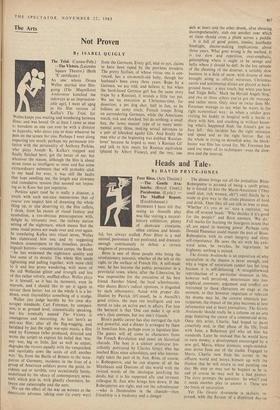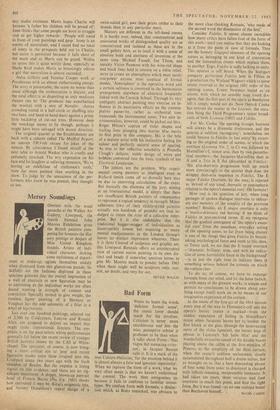Heads and Tale.)
By DAVID PRYCE-JONES Poor Bitos. (Arts Theatre.) —The Gentle Ava- lanche. (Royal Court.) Pocahontas. (Lyric.) The Muffled Report. (Establishment.) Bitos is one of those people who bring the revolutionary neurosis, whether of the left or the right, to the surface of French life. A self-made man, he has become the public prosecutor in a provincial town, where, after the Liberation, he was responsible for the execution of his best friend. Another friend, the local schoolmaster, who shares Bitos's radical opinions, is disgusted by such inhumanity. Acted with proper dis- illusion by Patrick O'Connell, he is Anouilh's good citizen, the man too intelligent and too moral to take an active part in affairs. For him the betrayal is that. 'One can make it up with one's class enemies, but not one's friends.'
Bitos's public career has also outraged the rich and powerful, and a dinner is arranged by them to humiliate him, perhaps even to liquidate him. The guests will all come as characters from the French Revolution and enact an historical charade. The host is a sinister aristocrat (ex- cellently portrayed by Charles Gray) Who has loathed Bitos since schooldays, and who interest- ingly takes the part of St. Just. Bitos, of course, is Robespierre, and he can dispose of all the Mirabeaus and Dantons of this world with the twisted words of the ideologue justifying his deeds, but it is his supposed ally and intimate colleague St. Just who brings him down. If the Robespierres are right, and not the schoolmaster —who is Desmoulins in the charade—then friendship is a weakness and a danger The dinner brings out all the prejudices. Bitos- Robespierre is accused of being a spoilt priest, he is forced to kiss the Marie-Antoinette (`They smell nice, rich women, eh?') until finally he is made to give way to the crude pleasures of food and drink. Then they all can talk as man to man. `Whether it's you or us,' says a capitalist, 'we dine off severed heads.' Who decides if it's good for the people?' and Bitos answers, 'We do.' Full marks for learning the bourgeois lesson that all are equal in wanting power. -Perhaps only Donald Pleasence, could master the part of Bitos- Robespierre with its cruel integrity and slimy self-importance. He saws the air with his awk- ward arms, he twitches, he ingratiates. he frightens; nothing is missed.
The Gentle Avalanche is an exposition of why naturalism in the theatre is never enough, and why a vogue of naturalism cannot last for long because it is self-defeating. A straightforward reproduction of a particular situation in life, however well perceived, deteriorates into bio- graphical comment; argument and conflict are restrained to those characters on stage at the moment, so that however important or relevant the drama may be, the context obstructs par- ticipation; the impact of the play becomes at best ' informative and at heart journalistic. The Gentle Avalanche should really be a column on an arts page featuring the career of a commercial artist. Once this artist, Charlie, had hoped to paint creatively and, in that phase of his life, lived with June, a' Bohemian girl who set him his standards. Later he realised that he would have to earn money, a development encouraged by a new girl, Mavis, whose domestic single-minded- ness drove June out of the studio. Engaged to Mavis, Charlie now finds his corner in the affluent world and buoys himself up with the illusion that he will return to real painting one day. He may or may not be happier as he is, and of course he may well be a bad painter. The story prompts the question: So what? and it needs another play to answer it These are the limits of naturalism.
Yet The Gentle Avalanche is skilfully re- ported. with the flavour of a dispirited day-to.
day studio existence. Mavis .hopes Charlie will become 'a father his children will be proud of June thinks that some people are born to struggle and so get higher rewards: 'People will stand in front of your paintings and gasp.' Irony is an enemy of naturalism, and I could find no trace of irony in the prospects held out to Charlie, but satire is permitted because it falls short of the mark and so Mavis can be guyed.- Within its terms this is quite wittily done, especially as Sheila Reid makes Mavis so bounCingly odious a girl that naturalism is almost exceeded.
Anita Gillette and Terence Cooper work at Pocahontas with an almost embarrassing energy. The story is presentable, the score no worse than usual although the orchestration is blatant; and the total effect is as dispiriting as only mediocre theatre can be. The producer has anxsthetised the musical with a shot of Novello: chorus crowding round in a half-circle or shuffling into two lines, and hand-in-hand duets against a prissy little backdrop of cut-out trees. However deep the wreckage seems to lie though, perhaps it might have been salvaged with decent direction.
The original quartet at the Establishment are back with a cabaret called The Muffled Report, an uneven TW3-ish excuse for jokes of the minute. By coincidence I found myself at the next table to Arnold Wesker who is cruelly and unfunnily attacked. The wry expression on his face and his laughter at relieving moments, 'We're having an exhibition of craftsmen's tools,' were far more pointed than anything in the show. To judge by the uneasiness of the per- formers who knew he was present, they thought so too.



































 Previous page
Previous page